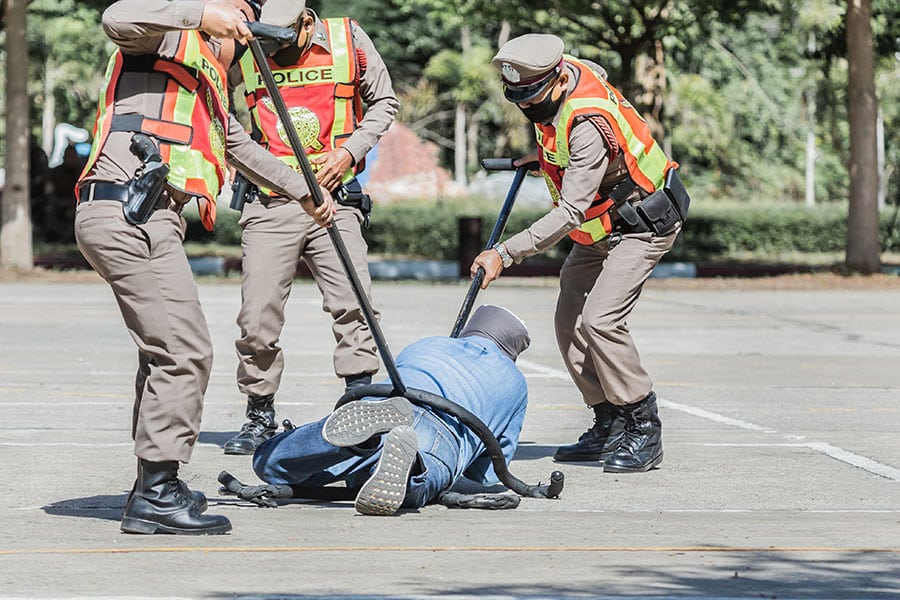Coming into money can be exhilarating, but it can often lead to financial problems. To avoid any monetary disasters, plan what you intend to do with your settlement money before you cash your check.
What Do I Do After I Win An Excessive Force Settlement Check?
Excessive force settlements tend to be personal injury cases. Cases involving police misconduct, unnecessary force by law enforcement, being falsely arrested without reasonable cause, or being fatally shot can entitle you or your family to personal injury settlements.
There are two types of payouts for this: lump sum and structured settlements. Structured settlements payout your funds over time, giving you a recurring paycheck. Lump sums, on the other hand, award you the entire settlement in one check.
Lump sums may seem like the ideal option, but they have risks. It’s much easier to mismanage funds that are awarded all at once. There are several considerations you’ll need to keep in mind before spending your settlement check.
Wait Before Spending
A common mistake many personal injury settlement recipients make is spending their money immediately. So before you do you need to make a plan for the future.
Some purchases can have additional costs down the road, so you’ll need to account for them. If you plan to buy a house, for example, know how much you’ll pay for your mortgage and property taxes. Make a plan around how you’ll pay these future expenses.
Understand and Address the Tax Implications
It’s important to consider how much of the money you’ll need to put aside for taxes. The tax implications for your settlement depend on the type of case.
Most excessive force cases are for a personal injury settlement. Personal injury cases can also involve car accidents, wrongful deaths, motorcycle injuries, pedestrian accidents, and other punitive damages.
If your settlement comes from a personal injury case, you do not have to pay additional taxes. Because these types of cases are not considered income, they are not taxed.
Check with your lawyer to find out what type of settlement your case is. This will help you determine the full tax implications of the settlement. Make sure you put aside the amount of taxes you’ll need to pay to avoid accidentally spending more than you have.
Plan for the Future
You want the money to last. Make a plan to ensure it does. Know what your expenses are to maintain your lifestyle and how you can continue generating funds to meet the costs.
If you want to continue receiving payments long into the future, consider investing some of your settlement. Make financial decisions that make sense for you and your future.
If you’re unsure about how to manage or invest large sums of money, contact an expert. Financial planners can help you make the right financial decisions for you.
How Long Does It Take to Get Money After a Settlement?
After you win an injury lawsuit, it can still take some time before you receive the money. It will typically take around a month to receive funds. However, there are some delays that can make this process take longer.
Common Delays in Getting Your Money After a Settlement
There are legal processes for distributing settlement money. If any of these tasks are delayed, it will take longer for you to get your money.
One common delay is drafting the formal settlement agreement. Your legal team will need to approve the release form before the settlement is finalized.
You’ll also need to sign the document. Sometimes this requires a notary. Any unforeseen difficulties in creating a final document or a legally binding signature will delay the settlement process.
Once the agreement is final, the money must go through several hands before it reaches yours. First, the party responsible for payment, be it the defendant or their insurance company, must issue the check. The money will pass from their attorney to yours.
There are legal limits on the amount of time the issuer has to send you funds. You can ask your attorney for your state’s laws on how long they have to issue a check.
Legal firms will wait until the check clears before getting the money to you. If there’s any trouble with the funds it will take longer to get it to you. Bank holidays will also further delays. The personal injury firm will also remove attorney and legal fees before sending the money to you.
Getting Funds Until the Settlement Check Clears
Until the personal injury settlement check clears, you won’t be able to access any of the funds. Ensure you have a plan to meet all of your financial obligations in the meantime.
If you need funds immediately, you can acquire a lawsuit loan to help you with upcoming expenses. These loans are designed to help you cover expenses while you wait for your settlement check.
Speeding Up the Process of Receiving Your Settlement Check
Your injury lawyers know what documents and procedures are needed to collect settlement funds. To make the process as efficient as possible, they will prepare the needed paperwork as quickly as possible.
How an Attorney Can Help
Personal injury settlements and legal proceedings can be complicated. You’ll need a personal injury lawyer to help you navigate the process. Having an attorney will make getting your funds easier and faster.
Have questions about your settlement? Call us at 800-847-3528.
